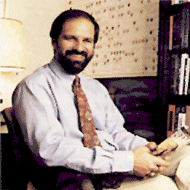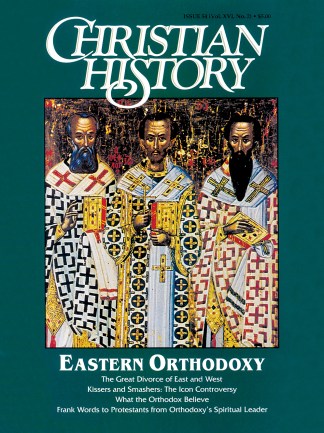
Reading history is like being a tourist through time. You get to visit all manner of exotic people and places. Well, welcome to one of the most exotic journeys Christian History has taken.
Orthodoxy is a complete unknown to some, a great mystery to others. Orthodox priests wear long beards and glittering robes; believers cross themselves and bow incessantly during worship, and their churches are packed with somber religious pictures. No mistaking these folks for Baptists.
Yet the very strangeness of Orthodoxy is what attracts us. When we look closer, we see that these believers have been Christian in this way for some 1,900 years. It's a way of being Christian that has created and sustained great cultures (Byzantine, Russian), and one that has endured some of the fiercest persecution (from Muslims and Marxists) in church history. Today, it's a way of being Christian that makes sense to some 215 million people.
A quick glance suggests, then, that this church may not be merely unusual but a unique and powerful expression of the Christian faith.
We've tried to keep the focus on the years 300 to 1204, but we've fast-forwarded centuries ahead sometimes if we felt it would help you better understand Orthodoxy today. "The Great Divorce" looks at the time when Christians East and West went their separate ways, and I relied on Orthodox sources so we could see the Schism from the Orthodox perspective.
The articles on icons, monasteries, key figures (Gallery), councils, and worship are all written by Orthodox scholars. They highlight some of the distinctive practices and heroes of Orthodoxy. In "What the Orthodox Believe" and "An Evangelical Appraisal" two Protestant theologians help us compare Orthodox and Protestant theology and practice. Finally, in the interview with Ecumenical Patriarch Bartholomew I (spiritual head of worldwide Orthodoxy), His All Holiness speaks forthrightly about issues facing Orthodoxy today. While an abbreviated version appears in our regular magazine, you can read the entire interview in this online version.
Our approach, as usual, is to try to understand Orthodoxy from the perspective of the Orthodox. We hope there are times in the issue when you think, That's pretty cogent—and attractive. This approach confuses some readers; some will assume we're trying to evangelize for Orthodoxy. Hardly. We just happen to believe that we cannot truly understand a historical subject unless we can empathize with it. So we hope as you go on this exotic journey, you will, at least for brief moments, see the world through Orthodox eyes.
Copyright © 1997 by the author or Christianity Today/Christian History magazine. Click here for reprint information on Christian History.










